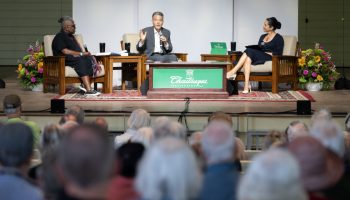
Having studied interdisciplinary subjects at Northeastern University such as politics, philosophy and activism, Pablo Hernandez Basulto feels it’s important to view theater as widely interconnected with social advocacy.
“I didn’t want to go somewhere to study theater in a bubble,” he said to Northeastern Global News in 2017. “Theater doesn’t exist separate from these other fields. Rather, it’s a way of communicating all these ideas.”
In his lecture at 10:45 a.m. today in the Amphitheater, Hernandez Basulto will continue with the Chautauqua Lecture Series Week Three theme “Art in Action: Building Community Through the Arts” with a discussion centered around community-engaged theater and the role of cultural institutions in fostering civic engagement.
Hernandez Basulto is director of the Civic Artistic Programs, overseeing the Public Works and Mobile Unit initiatives at The Public Theater, which operates on the principles that theater is an essential cultural force and that art and culture belong to everyone.
When working on theater projects in Rio de Janeiro and London that engaged homeless people in the arts, Hernandez Basulto felt that this impactful opportunity allowed him to investigate theater as a catapult for positive evolution.
“It clarified my priority as an artist that, even if I’m not working directly with the people in oppression, I have the opportunity to present a larger question that does lead to change,” he said to Northeastern Global News.
Originally from Cuernavaca, Mexico, Hernandez Basulto kicked off his love for theater at just 6 years old, and it hasn’t faltered since.
However, when he discovered a technique by Augusto Boal called “Theater of the Oppressed,” which engages the audience to promote social and political change, during a pre-college theater program at Carnegie Mellon University, Hernandez Basulto was moved.
This altered his trajectory and opened up theater as a potential long-term position for the kind of transformation that he felt was needed. When Hernandez Basulto got to spend time with the late Boal’s family while digitizing his archives, he saw it as a “life-changing event,” he told Northeastern Global News.
A project Hernandez Basulto created with Robert Duffley in 2016 called Crossing Borders looked at “experiences that acknowledged the complex relationship between my home country and my adopted one,” he said in Six by Eight Press.
The project urged listening over assuming — individual stories over divisiveness. Concentrating on the drug-trafficking between the United States and Mexico, Hernandez Basulto created three iterations — a short image piece, monologues and a play — to creatively engage on Mexican-American relations; additionally, he and Duffley designed a fake border crossing in the hallway while acting as border patrol officers from their respective home countries.
“For those of us looking for solutions,” Hernandez Basulto said in Six by Eight Press, “the game is no longer about guilt and who is oppressing who but about forming alliances that acknowledge that the larger structural injustice exists on both sides of the border.”




